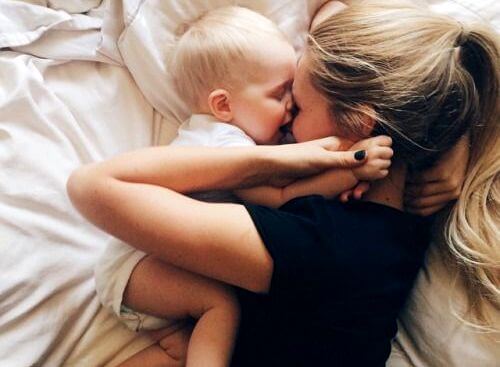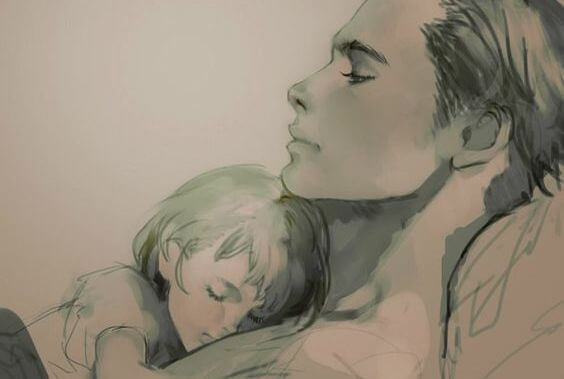Love Creates Strong Bonds with Babies

January, February, March, April…It doesn’t matter what month we were born in. But those who were born surrounded by kisses please stand up and raise a glass. Spending our first years in an environment full of love in which we were able to form safe emotional bonds is a gift we frequently underestimate. Because when we received it, we were still far from understanding how lucky we were.
Babies are capable of smelling love, kindness, rejection, among other feelings and sensations. This is why during the first years of life, they already develop a preference for some people instead of others. Even before taking their first steps, babies begin to relate to emotions and start setting the first foundations to what will be their emotional development. This is a fascinating process they will be immersed in their whole lives. One of the first milestones in their development will be to create their first emotional bonds.
If we think about it, we’ll probably realize that babies and grownups are not so different from each other. When it comes time to choose our favorite people and create affective bonds with them, we are very much alike. The explanation of this is simple. We learn to discriminate between those who treat us right and give us well-being and those who simply don’t.

Why are affective bonds so important for newborns?
Several clinical trials sustain that affective bonds are fundamental for babies. Harlow’s experiment, for example, shows that a deprivation of maternal responses produces developmental and learning issues in children. These problems can go from difficulties in terms of growth to emotional issues.
These bonds are created when parents give their children sustained care. This care goes further than just covering basic needs, providing food and putting a roof over the child’s head. By sustained care we mean support, protection, well-being, physical contact, affection, shelter during distressing situations, among others.
You must not underestimate emotional intelligence in babies. Babies start carefully organizing all of their social experiences during their first years of life. And I say carefully because they don’t miss any details about what is going on around them. They absorb all of the differences and details they can notice, and they manifest their preferences towards these.

What skills do babies need to form these affective bonds?
Babies move forward in the world through their senses: touch, smell, taste, sight and hearing. Senses are their vital weapons to learn and to relate with their parents as well as with their environment. Their complex thought channels are not mature yet, and their way of interacting has much to do with impulses.
From the moment they are born, babies have a preference for the human voice. So every time they hear the voices of their figures of attachment, different parts of their brains activate. Also, a million of connections will take place which are necessary for the development process.
On the other hand, babies respond quickly to skin-to-skin contact and to visual contact, as well. For babies, these two types of contact act like natural agents for relaxation. In turn, contact favors both the physical growth and the optimal general development of the newborns.
 How are affective bonds established?
How are affective bonds established?
Any given moment is a perfect opportunity to spoil and hold your baby. However, there are certain moments which are more sensitive and favorable for the creation of these bonds. We are talking about temporal places which, though many times seem obvious, we usually overlook.
The first of these moments is, of course, the first time the mother holds her baby to breastfeed him immediately after giving birth. In that moment, the newborn is especially receptive. Unfortunately, there are births in which there are complications. Immediately after it, the baby needs medical care. However, it is also true that as long as it is possible, it would be advisable for the mother to take advantage of this moment.
The following breastfeeding sessions are still great times to continue with the formation of bonds. Whether it is breastfeeding or bottle, it’s a perfect opportunity to enjoy. A chance to look into the baby’s eyes and to talk to it. Babies tend to imitate facial expressions, gestures, and the sounds of their reference figures from a very early age.
Taking a bath with our babies, imitating their movements, giving them massages, or just getting up at midnight to give them a bottle or breastfeed them, even changing their diapers are small moments which can help establish a bond of attachment with the baby.

Giving affection
The process of forming bonds with our children is a unique, personal and highly fulfilling experience. It is definitely one of the great privileges of being a parent. There is no magic formula which indicates how this task must be done. There are no steps to follow when it comes time to giving affection and love. It is a natural process which parents must simply surrender to.
Kids don’t remain kids for very long. But it’s in this time lapse when children create solid foundations for their affective bonds. In turn, these bonds unite them to the people they trust. A foundation for their personality is also established within this period of time. Keep in mind that what we manage to transmit to them in those crucial moments, they will carry for the rest of their lives.
To you, mother or father who I don’t personally know, I’ll say this: the first years of life go by very fast. Enjoy your baby with limitless kisses, hugs and caresses. In the blink of an eye, this period full of emotions and unforgettable experiences is gone. So, make the most you can out of it. Ultimately, give everything you have to your baby, and let it love you back.
This text is provided for informational purposes only and does not replace consultation with a professional. If in doubt, consult your specialist.








